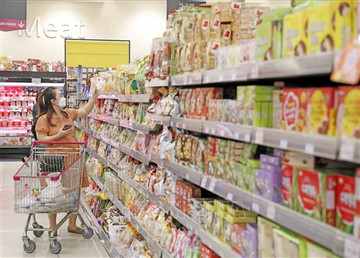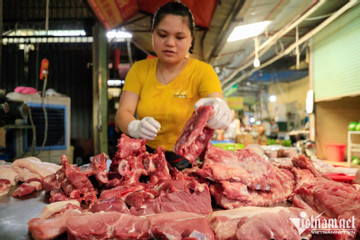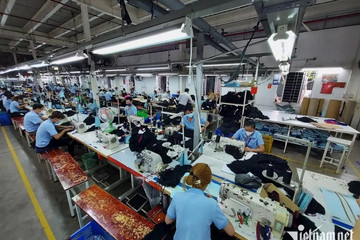- © Copyright of Vietnamnet Global.
- Tel: 024 3772 7988 Fax: (024) 37722734
- Email: evnn@vietnamnet.vn
CPI
Update news CPI
Market prices stay high despite sharp falls in petrol prices
The nation has seen food prices remain stubbornly high despite the recent sharp decline in gasoline prices.
CPI goes up 2.54 per cent in seven months: GSO
The July consumer price index (CPI) grew 0.4 per cent from the previous month, contributing to the year-on-year growth of 2.54 per cent in the first seven months of this year, the General Statistics Office (GSO) said on Friday.
Struggling businesses sell to foreign investors
The sharp increases in material prices in H1 and the small support packages to businesses have put pressure on companies.
Food prices still high despite petrol price cuts
From its peak, petrol prices have fallen by 20.7-25.6 percent to the level of five months ago. However, food and foodstuff prices have not dropped.
Agencies propose tax, fee reductions as prices escalate
The price increases of crude oil and input materials of many industries have led to increases in finished products, putting a burden on businesses and people.
The paradoxes of growth
The high economic growth rate and the prosperity of a number of business fields in H1 demonstrates the judiciousness of the decisions to change the country's Covid-19 prevention and control strategy.
Inflation statistics and confidence levels
As a reporter in charge of macroeconomic news, I always seek to read statistics because figures are not biased and allow me to have an overall view of things. But, honestly speaking, not all statistics give me a sense of confidence.
Tax cuts, fee reductions expected to go into effect soon
Although the price of petrol has fallen since July 11, several business associations and agencies proposed reductions in taxes and fees to support businesses because of unpredictability and fluctuations in gasoline prices.
CPI: from dining to conference table
Last weekend, I visited the family of an acquaintance and fell into a funny situation. Everything began from a discussion about the consumer price index (CPI).
VN businesses hit by ‘price storm’
Many business fields have been witnessing a rapid recovery after the Covid-19 outbreak. However, difficulties are ahead as they lack capital and petrol prices are escalating.
Vietnam’s CPI up 2.44% in six months
Vietnam’s consumer price index (CPI) in the January – June period rose by 2.44% year-on-year while its core inflation edged up 1.25%, the General Statistics Office (GSO) reported at a press conference on June 29.
Reducing petroleum prices to curb inflation
The news that the Ministry of Finance (MOF) has proposed the further cutting of environmental protection tax and the removal of the petrol price stabilization fund has brought a fresh breath of air to people and the economy.
“Price storm” forces workers to tighten their belts
The petrol price hike has led to price escalations of major goods and services, forcing low-income earners to tighten their belts.
Vietnam to increase petroleum reserves by 4 times
As the State’s resources are limited, the increase in the national petroleum reserves will be implemented under a roadmap from now to 2025.
No increases in medical service fees
There will be no increases in prices of medical examination and treatment.
Weathering the storm, Vietnam economy remains stable among uncertainties
The building of an independent and self-reliant economy associated with extensive international integration needs to start from businesses, especially private ones, in order to increase resilience and improve internal forces.
‘Easy money’ period ends, interest rates rise
To avoid exchange rate and capital outflow risks, interest rates in Vietnam are expected to rise, while the bad debt ratio is likely to increase sharply.
Curbing inflation: large ‘dose of medicine’ may cause after-effects
If inflation cannot be controlled and Vietnam has to use a “high-dose drug”, such as an interest rate increase, serious consequences may occur.
Vietnam’s CPI up 2.25 percent in five months
Vietnam’s consumer price index (CPI) in the first five months of the year edged up 2.25 percent year-on-year while core inflation rose by 1.1 percent, according to the General Statistics Office (GSO).
Keeping CPI below 4 pct this year a challenge for VN: Economist
It will be a challenge to keep Consumer Price Index (CPI) growth under 4 percent this year, according to an economist.



















